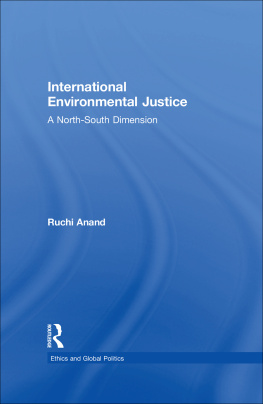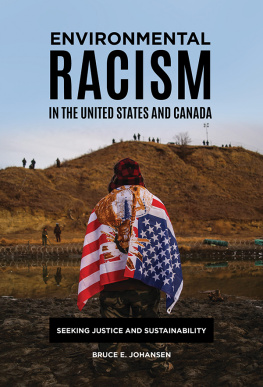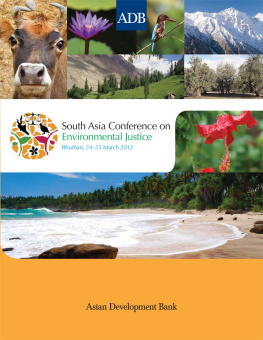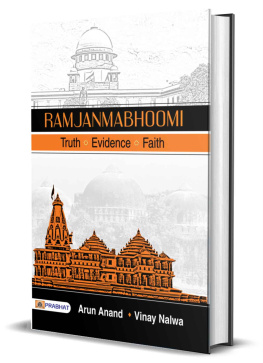INTERNATIONAL ENVIRONMENTAL JUSTICE
Ethics and Global Politics
Series Editors: Tom Lansford and Patrick Hayden
Since the end of the Cold War, explorations of ethical considerations within global politics and on the development of foreign policy have assumed a growing importance in the fields of politics and international studies. New theories, policies, institutions, and actors are called for to address difficult normative questions arising from the conduct of international affairs in a rapidly changing world. This series provides an exciting new forum for creative research that engages both the theory and practice of contemporary world politics, in light of the challenges and dilemmas of the evolving international order.
Also in the series
Understanding Human Rights Violations
New Systematic Studies
Edited by Sabine C. Carey and Steven C. Poe
ISBN 07546 4026 4
First published 2004 by Ashgate Publishing
Published 2016 by Routledge
2 Park Square, Milton Park, Abingdon, Oxon 0X14 4RN
711 Third Avenue, New York, NY 10017, USA
Routledge is an imprint of the Taylor & Francis Group, an informa business
Copyright 2004 Ruchi Anand
Ruchi Anand has asserted her right under the Copyright, Designs and Patents Act, 1988, to be identified as the author of this work.
All rights reserved. No part of this book may be reprinted or reproduced or utilised in any form or by any electronic, mechanical, or other means, now known or hereafter invented, including photocopying and recording, or in any information storage or retrieval system, without permission in writing from the publishers.
Notice:
Product or corporate names may be trademarks or registered trademarks, and are used only for identification and explanation without intent to infringe.
British Library Cataloguing in Publication Data
Anand, Ruchi
International environmental justice : a North-Southdimension. - (Ethics and global politics)
1. Environmental justice 2. Environmental protection - International cooperation 3. Environmental justice - Regional disparities
I. Title
363.7
Library of Congress Cataloging-in-Publication Data
Anand, Ruchi, 1970-
International environmental justice : a north-south dimension / Ruchi Anand.
p. cm. -- (Ethics and global politics)
Includes bibliographical references and index.
ISBN 0-7546-3824-3
1. Environmental justice. I. Title. II. Series.
Reprinted 2005
GE220.A53 2003
363.7--dc22
2003060114
ISBN 9780754638247 (hbk)
Contents
The seeds of this book were implanted in my head the day I embarked on a personal quest for justice. Issues of justice and injustice constantly resonated in my brain. Discussions with family, friends, professors, colleagues, all seemed to center around, and continue to be focused on, justice what is justice, how can we frame justice, theorize about it or even care about it? These discussions usually framed themselves as justice-injustice issues that exist between (dichotomized) entities such as man-woman, white-black, rich-poor, powerful-powerless, strong-weak, north-south. The North-South dimension of justice took shape as my PhD thesis at Purdue Universitys Department of Political Science. I found room for theorizing and a forum for thinking, researching and writing about a fascinating and complicated subject, justice. This project later took shape and resulted in the publication of this book.
Many people contributed in different ways to the completion of this book. I am happy to express my gratitude to friends, family, and mentors whose support was invaluable in the completion of this book. I would like to thank my dissertation committee advisers Prof. L.R. Beres, Prof. Pat Boling, Prof. Berenice Carroll and Dr. Gerald Thomas for their invaluable feedback, edits, and encouragement. I would like to particularly thank Dr. Patrick Hayden for providing helpful comments and assistance throughout the publication process.
I owe a special thanks to my parents Lt. Gen. R.K. Anand (Retd.) and Nanah Anand, who gave me the opportunity and the drive to be who I am today. Thanks also to my sisters, Namit Chhiber, Neeti Gujral and Ind Anand for their unconditional love and appreciation.
Most of all, I would like to thank my most precious companion and husband Stphane Monrocq for his endless love, support, understanding and welcome insights and distractions during the completion of this book.
I thank the energies of the universe - the sun, the stars, the moon, the rainforest, the sky, the rivers, seas and oceans, the land ... and the beauty of nature for having given me the passion to love the environment just as I love justice, peace, non-violence and life!
R.K. Pachauri
Director General, The Energy Research Institute (TERI) and
Chairman, Intergovernmental Panel on Climate Change IPCC
This book comes at an opportune moment, because perhaps never in the evolution of international relations has the concept of justice within the framework of North vs. South received such worldwide attention. The World Summit on Sustainable Development (WSSD) held in Johannesburg in 2002 was a unique event, not so much for the agreements that were reached there, but certainly on account of the dynamic and the sharp focus that was established before the Summit actually took place. Several factors were responsible for the attention, both explicit and implied, that was provided at Johannesburg to the moral arguments favoring a more equitable form of justice between different nations. There are several reasons that accounted for this focus on issues of equity. Firstly, the Millennium Summit of September 2000 was driven essentially by concerns for the poorest of the poor, and this was also highlighted in the summit on financing and development, which took place in Monterrey earlier in 2002. Secondly, the venue of the WSSD in Johannesburg provided a very visible reminder of the difference between rich and poor, which is so evident in South African society itself, but also because several of the side events and demonstrations that took place, with their roots in the poor societies of Africa, were a sharp reminder of the growing disparity between North and South and the international regime which seems to accentuate these disparities. There was, for instance, a large demonstration where sugar imported from Europe was set on fire to dramatize the injustice to African farmers who cannot compete with the European Unions subsidies that suppress sugar prices prevalent in Europe.
There are other aspects in which equity issues are perhaps affecting the lives and livelihoods of people in different comers of the globe. Take the subject of climate change, which is overwhelmingly the result of cumulative emissions of greenhouse gases from the developed nations of the North. The impacts of climate change, however, are predominantly felt by societies in the countries of the South. Since these societies are also some of the poorest in the world, they lack the capital, the capacity and the physical infrastructure which might enable them to adapt successfully to the impacts of climate change. These inadequacies only compound the inequitable system of justice under which the actions of one part of global society are felt unfavorably and totally uncompensated by other sections of human society.
Dr. Ruchi Anands treatment of various aspects of justice and her excellent legal analysis and questioning of North-South issues related to the environment is not only of great value to the legal profession and the new discipline that is emerging in the area of international environmental negotiations, but it provides stimulating treatment of the subject to satisfy readers from other disciplines as well. This book would certainly inspire other researchers to attempt further work on some of the issues raised in these pages I believe that would be the most authentic tribute to the value of Dr. Anands work.










![Anita Anand - The Library Book. Anita Anand ... [Et Al.]](/uploads/posts/book/40194/thumbs/anita-anand-the-library-book-anita-anand-et.jpg)